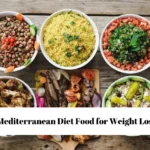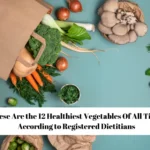Embarking on a weight loss journey can be challenging, but incorporating the right foods into your diet can make a significant difference. Discovering healthy options that not only satisfy your cravings but also support your weight loss goals is essential for long-term success. In this blog, we’ll explore 16 healthy foods that are rich in nutrients, low in calories, and perfect for boosting metabolism. From leafy greens to lean proteins, these foods will help you feel full while nourishing your body. Whether you’re aiming to shed a few pounds or maintain a healthy lifestyle, these nutritious choices will empower you on your journey to a healthier you.
1. Leafy Greens
Leafy greens like spinach, kale, and Swiss chard are packed with vitamins, minerals, and fiber while being low in calories. They offer a feeling of fullness with minimal calorie intake, making them ideal for weight loss. Leafy greens are also rich in antioxidants, which help to reduce inflammation and improve overall health. Their high fiber content aids in digestion and prevents overeating by promoting a feeling of fullness. Additionally, leafy greens can be easily incorporated into meals, whether in salads, smoothies, or as a side dish, making them a versatile option for weight loss.
Leafy greens also contain essential nutrients like calcium, which is linked to fat burning. They are rich in water content, further contributing to hydration and satiety. The versatility of leafy greens allows them to be incorporated into various diets, such as vegetarian, vegan, and low-carb plans. For individuals looking to lose weight, including leafy greens in daily meals can significantly reduce calorie intake while providing necessary nutrients.
2. Lean Protein
Protein plays a crucial role in weight loss as it boosts metabolism, reduces hunger, and preserves muscle mass. Lean protein sources such as chicken breast, turkey, fish, and plant-based options like tofu and legumes are ideal for those looking to shed pounds. When you consume protein, your body burns more calories during digestion, known as the thermic effect of food. This means that lean protein not only satisfies hunger but also helps to burn calories even during rest.
Moreover, lean protein helps to stabilize blood sugar levels, reducing cravings and the likelihood of overeating. A diet high in protein can also prevent muscle loss during weight loss, ensuring that fat, not muscle, is being lost. Protein-rich meals are highly satiating, meaning they keep you fuller for longer, which can prevent snacking on unhealthy options throughout the day. Including lean protein in each meal is a strategic way to support weight loss while maintaining energy and muscle mass.
3. Whole Eggs
Once feared for their cholesterol content, whole eggs are now recognized as a powerful food for weight loss. Eggs are nutrient-dense, containing essential vitamins and minerals like vitamin D, B vitamins, and selenium, as well as high-quality protein. Studies have shown that eating eggs for breakfast can increase feelings of fullness, leading to fewer calories consumed throughout the day. This is because the combination of protein and healthy fats in eggs keeps hunger at bay.
Additionally, eggs are relatively low in calories and can be prepared in various ways, making them a convenient and affordable option. Their ability to keep blood sugar levels stable makes them a great choice for breakfast or any meal. For those focused on weight loss, incorporating whole eggs into the diet can enhance satiety and reduce overall calorie intake without sacrificing nutritional value.
4. Avocados
Avocados are rich in heart-healthy monounsaturated fats, which can help promote weight loss by keeping you full and satisfied. These fats, specifically oleic acid, help to curb appetite and reduce unhealthy cravings. Avocados are also a good source of fiber, which further aids in digestion and satiety. A single avocado provides nearly 10 grams of fiber, making it an excellent food for those looking to lose weight.
The creamy texture of avocados makes them a versatile addition to meals, whether spread on toast, added to salads, or blended into smoothies. Although avocados are calorie-dense, their combination of healthy fats and fiber ensures that they are digested slowly, keeping hunger at bay for longer periods. Incorporating avocados into your diet can help you maintain a calorie deficit while still feeling full and nourished.
5. Berries
Berries such as strawberries, blueberries, raspberries, and blackberries are low in calories but high in fiber, vitamins, and antioxidants. The high fiber content of berries slows down digestion, leading to a prolonged feeling of fullness. Berries are also rich in water content, which adds volume to your meals without adding calories. Their natural sweetness can satisfy sugar cravings, making them a healthy alternative to sugary snacks.
In addition to their weight loss benefits, berries are packed with antioxidants that support overall health by fighting inflammation and protecting against chronic diseases. Their low glycemic index means they won’t cause a spike in blood sugar, making them suitable for those monitoring glucose levels. Berries are versatile and can be eaten on their own, added to yogurt, smoothies, or oatmeal, making them an easy and delicious addition to a weight-loss-friendly diet.
6. Greek Yogurt
Greek yogurt is an excellent source of protein, probiotics, and calcium, making it a powerhouse for weight loss. The high protein content in Greek yogurt helps to reduce hunger, maintain muscle mass, and boost metabolism, all of which are important factors in weight loss. Probiotics, the beneficial bacteria found in yogurt, improve gut health and digestion, which can further enhance weight loss efforts.
Choosing plain, unsweetened Greek yogurt is best, as flavored varieties often contain added sugars that can sabotage weight loss efforts. Greek yogurt can be enjoyed on its own, paired with fresh fruit or nuts, or used as a base for smoothies and dips. Its versatility and nutritional profile make it an easy and effective addition to a weight loss diet.
7. Nuts and Seeds
Nuts and seeds are rich in healthy fats, fiber, and protein, all of which help to promote satiety and control appetite. Almonds, walnuts, chia seeds, and flaxseeds, in particular, have been shown to support weight loss when consumed in moderation. These nutrient-dense snacks can prevent overeating by keeping you full for longer, reducing the need for unhealthy snacks.
Despite being high in calories, the fiber and protein in nuts and seeds contribute to a slower digestion process, which helps to regulate blood sugar levels and prevent spikes in hunger. Including a handful of nuts or seeds in your diet can provide long-lasting energy, making it easier to maintain a calorie deficit without feeling deprived.
8. Oatmeal
Oatmeal is a whole grain that’s rich in soluble fiber, which can help lower cholesterol and promote a feeling of fullness. The slow-digesting nature of oats helps to stabilize blood sugar levels, preventing energy crashes and unhealthy snacking later in the day. Oatmeal is also low in calories and can be customized with various toppings such as fruits, nuts, and seeds, making it a versatile and satisfying breakfast option.
Studies have shown that people who eat oatmeal regularly tend to consume fewer calories throughout the day, as the fiber content keeps them full for longer periods. The beta-glucan fiber found in oats has also been linked to improved metabolism and fat burning, further supporting weight loss efforts.
9. Salmon
Salmon is a fatty fish that’s rich in omega-3 fatty acids, which have been shown to reduce inflammation and promote fat loss. In addition to healthy fats, salmon is also an excellent source of high-quality protein, which helps to preserve muscle mass during weight loss. The combination of protein and healthy fats in salmon makes it incredibly filling, reducing the likelihood of overeating.
Omega-3s also play a role in regulating hormones that control appetite, making salmon a great food for weight management. Regular consumption of salmon can improve heart health, reduce inflammation, and support overall well-being, making it a valuable addition to any weight loss plan.
10. Sweet Potatoes
Sweet potatoes are a nutritious, fiber-rich root vegetable that can support weight loss by promoting fullness and stabilizing blood sugar levels. Their high fiber content helps to slow down digestion, keeping you satisfied for longer periods. Sweet potatoes are also rich in vitamins and minerals, particularly vitamin A, which is important for immune function and vision.
The natural sweetness of sweet potatoes can help curb cravings for sugary foods, making them a healthy alternative to processed snacks. Whether baked, boiled, or mashed, sweet potatoes can be incorporated into meals as a filling side dish that promotes weight loss without sacrificing taste or nutrition.
11. Apples
Apples are a low-calorie, high-fiber fruit that can aid in weight loss by promoting satiety and reducing overall calorie intake. The high water content of apples, combined with their soluble fiber, makes them a filling snack that can prevent overeating. Apples also contain natural sugars that satisfy sweet cravings without spiking blood sugar levels, making them a healthier alternative to processed sweets.
Eating an apple before a meal has been shown to reduce overall calorie intake, as the fiber in apples helps to slow digestion and keep hunger at bay. Apples are easy to carry and consume, making them a convenient and nutritious option for those looking to lose weight.
12. Quinoa
Quinoa is a whole grain that’s high in protein, fiber, and various essential nutrients. Unlike most grains, quinoa is a complete protein, meaning it contains all nine essential amino acids, which are crucial for muscle repair and growth. The high fiber content in quinoa helps to promote fullness, reducing the likelihood of overeating.
Incorporating quinoa into meals can support weight loss by keeping you full and satisfied without the need for excessive calories. It’s also gluten-free, making it a great option for those with dietary restrictions. Quinoa can be used as a base for salads, added to soups, or served as a side dish, making it a versatile addition to a weight loss diet.
13. Beans and Legumes
Beans and legumes such as lentils, black beans, and chickpeas are rich in protein and fiber, which help to promote satiety and support weight loss. The high fiber content in beans slows digestion, keeping you full for longer periods and preventing overeating. Beans are also a great source of plant-based protein, making them an ideal option for vegetarians and vegans looking to lose weight.
Additionally, beans are low in calories and can be incorporated into a variety of dishes, from soups and stews to salads and wraps. Their versatility and nutritional profile make them a valuable addition to any weight loss diet, helping to reduce calorie intake while providing essential nutrients.
Conclusion
Incorporating these 16 healthy foods into your diet can pave the way for successful weight loss. By choosing nutrient-dense options that support your body’s needs, you’ll not only achieve your weight loss goals but also promote overall well-being. Remember, sustainable weight loss is about balance and making informed choices. Embrace these foods, enjoy the journey, and watch as you transform your health for the better!
FAQs
What are some easy ways to incorporate these healthy foods into my diet?
You can add these foods to smoothies, salads, or as snacks. Experiment with different recipes to keep your meals exciting and nutritious.
Can I still enjoy my favorite foods while trying to lose weight?
Absolutely! The key is moderation. You can enjoy your favorite treats occasionally while focusing on a balanced diet rich in healthy foods.




